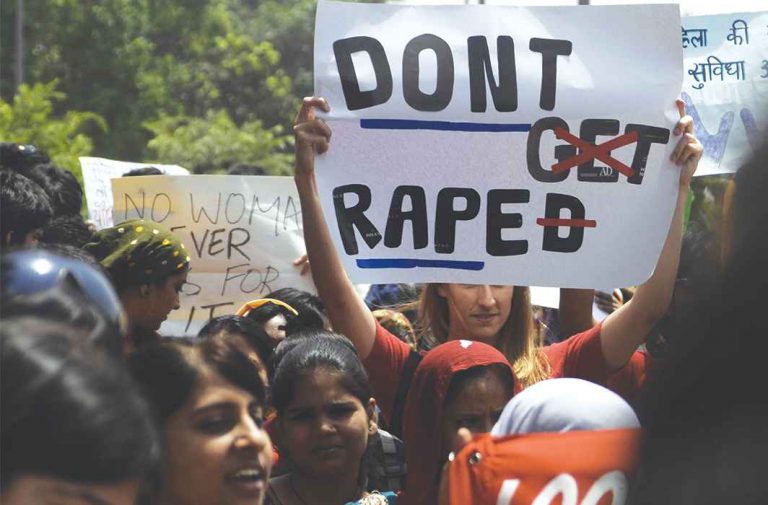
Above: A procession taking place against Rape (file picture). Photo: Anil Shakya
Top court clarifies that verdict not about marital rape but in reading down exception 2 of S 375 of IPC and about age of consent; court also flays the practice of child marriage and wants Govt. to take action
The bench of Justices Madan B Lokur and Deepak Gupta has decided that a husband’s having sex with his wife who is aged between 15 and 18 years is a punishable offence under the Indian Penal Code (IPC) – as amended by the Criminal Law (Amendment) Act, 2013. The bench directed that the police can arrest and prosecute the husband if the wife complains.
This is the verdict that the bench delivered on Wednesday (October 11), but the bench also made it clear that it has not dealt with the issue of marital rape. That issue is being heard at the Delhi High Court, so the apex court has not moved into that realm. In case of marital rape age ceases to be an issue. This is a specific area within the wider issue of marital rape.
In giving its verdict, the apex court clearly stated that exception 2 to section 375 of the IPC (law on rape) was discriminatory, capricious and arbitrary under Article 14 (which provides for equality before the law and equal protection… and prohibits discrimination on grounds of religion, race, caste, sex or place of birth, or any of them) of the Indian Constitution as well as under the POCSO Act.
The bench also observed in its judgment that the states and the Centre must make some guidelines related to this. The case came up through a writ petition filed by an NGO Independent Thought, questioning the constitutionality of a provision permitting a man to have physical relationship with his wife if she is aged between 15 and 18.
The bench also expressed its concern over the practice of child marriage, observing that social justice laws are not being implemented with the spirit with which they have been enacted. It said the government has to take action to stop the mass child marriages that take place on the occasion of Akshay Tritiya and other such religious occasions.
Explaining the reading down of exception 2 of the section, the bench said: “The exception in rape law under the IPC is contrary to other statutes, violates bodily integrity of girl child.”
The Supreme Court had completed its hearing on the issue on September 6 and had reserved its judgment.
While the Supreme Court bench clarified that it had not dealt with marital rape, the NGO’s contention in its writ was that this act of the husband, without the consent of the bride, needs to also be termed marital rape.
In fact, it was clear in the argument of advocate Rana Mukerjee, for the Union of India, that the age of consent was important. He had said: “The Law Commission’s 77th report makes a provision for the girl to report any sexual offence, directly to highest police authorities. From the 13th Law Commission report pertaining to consent to have sexual intercourse, a committee was formed which raised the age of consent from 16 to 18 years.
“A committee formed under Justice Verma relied on this reference and recommended a compulsory age of 18 years to have sexual intercourse,” the counsel had said. However, he had virtually contradicted himself in placing before the court the position of the government, when he had said: “Consideration of rape in marriages would weaken traditional family values in India, and that marriage presumes consent.”
Then, as a backup thought, he had said that 15 to 18 years is a qualified age to have sexual intercourse. Even, Muslim Law recognises 15 years as the age of puberty.
This assumption that marriage presumes consent has not gone down well with the court. Not only does it runs in the face of age of consent (18), it also presumes that even if the bride refuses to have sex the law will assume that she has consented.
All that have been struck down by the court on Wednesday.
—India Legal Bureau
Also Read: Marital Rape: Does No Really Mean No?

